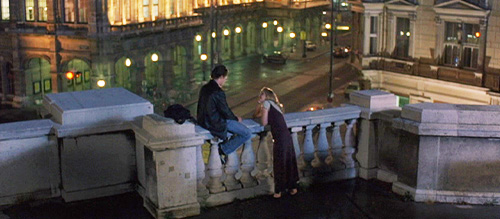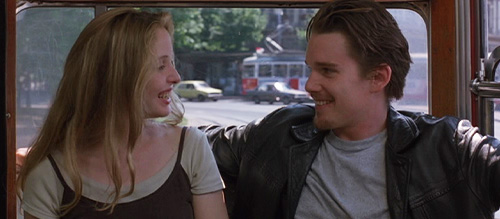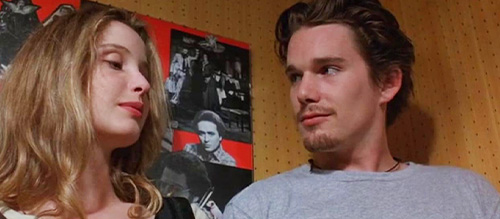Ravished by Romance – Before Sunrise’s Antithetical Approach to Love
Love is something that hits you like a lightning bolt. It ravishes you, repurposes you, moulds you into something new and, in most cases, creates something quite extraordinary, though it’s almost always unexpected. People fall in love in elevators, in grand parks, across book shops and at family gatherings. They speak of lifelong friendships turned into romance, awkward encounters turned into forevers. There’s a dramatic first kiss, tensions that put pressure on the passionately laid foundations of any given prospective relationship and, of course, the final proclamation of love… the very best moment of a person’s life.
At least that’s what the movies tell us…
As human beings born in the era of cinema – a relatively brand new art form at just over a century old, yet by far the world’s most accessible – we have been blasted since the day we were born with the same narrative tropes, visual cues, awkward ogling stares across rooms, and often quickly outdated soundtrack choices, to the point where romantic love feels every bit as made up as the grandest fantasy adventure; that rom-coms, romantic dramas and specifically The Notebook have been lying to us all along. Yet still, almost every single person remains in pursuit of this fantastical, forever mystical bond that can bind any two (or more) people, and often we come to find that moments in our lives can be underwhelming if not born of the same dramatic and truly cinematic narrative beats of the greatest silver screen romances. Why should your first kiss be a drunken hallway exchange after some dirty dancing in a dingey local club when it could be after a picnic eaten under the stars in some exclusive location that is free from the stresses (and light polution) of the real world? Why should a simple “yes” suffice when you could be met with something infinitely more poetic like “you had me at hello”?
Movies for decades, nay generations, have been filling stories of love and romance with the same fantastical elements as the greatest adventure movies, and we’ve let them; hoping that the one remaining part of our lives that is unpurchasable will one day redeem our souls for selling out to our capitalist overlords – “my trainers may have been made in a sweatshop, but I have succeeded in finding love and creating a family” (which happens to be another cinematic trope).
The antithesis to all of this is The Before Trilogy.
A series of films written and directed by Richard Linklater that purposefully push back against these tropes and conventions yet manage to equally capture your heart, Before Sunrise, Before Sunset and Before Midnight encapsulate the idea of love to an even greater degree than any number of the form’s most memorable romantic dramas and romantic comedies, yet resist surrender to the conventions of the genre quite so abruptly, quite so obviously. The series’ first entry Before Sunrise is particularly heart-wrenching and widely acknowledged as one of cinema’s greatest ever romantic movies, despite its surface differences. It is this film – a piece so determined to make the everyday extraordinary, and to explore love in the immediate term rather than a “forever after” – that will be the featured topic of this article.
Released a quarter of a century ago (1995), Richard Linklater’s Magnum Opus co-written by Kim Krizan and based upon a real-life brief encounter Linklater himself experienced, explores the blossoming of a relationship between a recent graduate from the United States, Jesse (Ethan Hawke), interrailling across Europe, and Celine (Julie Delpy), travelling from Romania back to her native France after a visit to her Grandmother’s house.
Though much of our adventure within the piece comes from realising the universal elements that bring the characters together, each revealed in momentary snippets of dialogue in the film’s now famously moving character exchanges, the true power of Before Sunrise comes in how utterly timeless it is; how it’s so specific to Linklater himself, yet so universal when presented on screen.
Much of this comes from how identifiable the characters are to people of their age, no matter which decade the movie is watched in, and how real their entire encounter feels.
Jesse and Celine come across like real people, even in spite of them both being highly reputable and recognisable actors (more so now than they were even then). They stumble through sentences, challenge each other, discuss the mundanities and logic that would dictate any spontaneous meeting such as theirs (they discuss how dangerous their spontaneity could be, converse about finding a locker for their bags, they mention how they should get off a tram, phone home, etc.), and they never quite seem to be performing in the typical sense; they don’t open their faces up to the camera quite like film stars usually do, and they’re almost never theatrical in their body language. They’re natural, unseasoned even, and Linklater not only captures this with such delicacy and beauty through his ever-naturalistic camera choices, but he encourages all of this to be the case, inviting mistakes and less typical ideas to create a film that somehow breathes through the characters and very much feels as alive as we’re led to believe each of them are.
Before Sunrise is praised most often for its sensationally constructed naturalistic dialogue, an element of the script Linklater was apparently adamant was stuck to as if gospel during filming but was worked on alongside stars Hawke and Delpy in pre-production to merge each of their personalities to the ones Linklater had himself imagined. The result is free-flowing conversation that features the characters pushing one another’s buttons and trying to establish ideas of themselves before each of them unravel into versions infinitely more true than where they began – Jesse being somewhat pompous, cynical and even pretentious at first, while Celine is notably more self-assured if a little more reserved and philosophical; both being unmissable and loveable screen presences by picture’s end.
At the beginning of the movie Jesse tells Celine of grand plans to create a documentary series and by the end he’s willfully describing his entire attitude as “stupid”. Their co-development from mere ideas (to each other, to us and even to themselves) through to realisations becomes in of itself an analogy for a relationship and how any relationship can ultimately make you feel comfortable in being your own vulnerable self. But they don’t get there through situational means, they get there through dialogue and (almost) dialogue alone.
Dialogue drives plot in Before Sunrise and not the other way around (as is typical of many films associated with the romantic genre/s).
Conversation flows, tensions rising and falling within any given scene in an antithetical way to most other films, but the result feels more real, these exchanges heightening the impact of when the tensions reach their peak; though when they do they are almost never typically negative tensions such as arguments, major disagreements etc., but rather sad realisations of their limited time together or, more often, momentary signals of acknowledgment for their growing feelings towards one another. Most importantly, these exchanges flesh out the building blocks of each character’s wants, needs and backgrounds, creating the truest sense of two real people gravitating towards one another.
It’s as if we are an outsider overhearing a day in the life of two young, hopeful and quietly hopelessly romantic individuals, as explained in further detail by The Royal Ocean Film Society…
Ethan Hawke himself has described Before Sunrise as “what might be”, and in many respects this is exactly what it is. Both Hawke’s character Jesse and Delpy’s character Celine are establishing who each of them are, battling for room in one another’s intellectual space and ultimately being cursed by their own youth – that feeling you only ever have when you’re young: that you’re invincible and all that is good shall come time and time again.
Celine herself says in Sunrise’s sequel Before Sunset, “I guess, when you’re young you just believe there’ll be many people with whom you connect with. Later in life you realise it only happens a few times.”
In Before Sunrise, Jesse and Celine do connect. Celine saying:
“So often in my life, I have been with people or spent beautiful moments like travelling, or staying up all night and watching the sunrise. And I knew those were special moments, but something was always wrong. I wish I’d been with someone else. I knew that what I was feeling, exactly what was so important to me, they didn’t understand. But I’m happy to be with you.”
There’s an element of experience inherent to the above quote, but this momentary acknowledgement of how special their evening has been is presented within the context of a conversation about how each of them shan’t write, call or ever see one another again; all to avoid the typical behaviours of others in their situation – to avoid the inevitable heartbreak of losing interest in one another as time goes on. They see their special moment as the first of many to come, as if their miniature adventure is just a promise of the lives they’ll lead.
Ultimately, they’re left heartbroken as their love is stolen away from them by the light of next day’s dawn, their youthful pride abandoned beside a departing train as they organise to meet again; a meeting that shall never happen.
“What might be” becomes “what might have been”, and this of course opens the door to its 2004 sequel Before Sunset.
Linklater’s vision of this on-the-surface simplistic romance is one akin to films from the French New Wave as well as one of the director’s mentors Terrence Malick, the camera being equally absent from the mind but incredibly important to the art, the edits between shots feeling seamless yet in rhythm at the same time. What’s more is that Linklater’s construction of the narrative as one that circles around dialogue, and the naturalistic performances born of this and Linklater’s own sensibilities, breathe energy into the piece that the director capitalises on through his visual expression.
There are a number of times in Before Sunrise where imperfections are evident – the edit doesn’t quite align, the camera shakes with the movement of the train, the pan isn’t quite steady, the focus is sometimes off – but this only helps to increase the reality and poetry of the piece.
Linklater, in including imperfections, replicates the true-to-life feel of the film – we too have moments we don’t quite focus upon correctly, or where we remember things in a disjointed fashion – and this all comes together to emphasise the piece as a living, breathing entity; pushing the reality inherent to the narrative (and particularly the dialogue) to the forefront of our minds, injecting an almost documentarian aspect that brings with it such an immense amount of feeling and introspection.
By the same token, these aspects of the visual mechanations of the film aid how timeless Before Sunrise comes to feel, the mixture of other elements – its natural lighting; largely classical music soundtrack; more traditional camera set ups; filming on film stock – emphasising this even further to create a piece as relevant today as it was twenty five years ago.
It is perhaps apropos that the true power of Before Sunrise comes in how inherrently against the grain of typical American cinema it is and how used to the tropes of its related genres each of us have become, yet to dismiss its relation to the genre overall would be naive; this article’s earlier “antithesis” bequeathing being not entirely accurate.
Sunrise, like so many of the genre’s more classic examples, functions within the framework of the cinema we know and love – three acts; a typical run-time (101 minutes); heteronormativity; “boy meets girl, they fall in love” narrative – perhaps most importantly adopting the idea of fantasy this article began by chastising.
In Before Sunrise, just as in The Apartment, Eternal Sunshine of the Spotless Mind or Call Me By Your Name, the romance of the piece is contained by a “fantasy world”, albeit one we can ourselves visit: Vienna.
The characters meet in a portal through space (a train), get off in a dreamscape (Vienna), are encouraged by said dreamscape’s inhabitants to fall in love (fortune teller; river poet; kind barkeeper), and when the bubble bursts… it’s over.
Reality smacks hard, but it’s a tale as old as time.
For our entire history, stories with the same basic narrative function have existed and Before Sunrise is no different. Its most important narrative pillar is, inherently, fantasy, but it is also inherently romance.
Before Sunrise does a lot to present itself as an antithesis to the stereotypical rom-coms and romantic dramas we’ve become accustomed to – narratively escaping the custody of the trope-tastic world of its fellow releases, focusing on an entirely new selection of constructive building blocks (dialogue over plot, intimacy over spectacle, etc.), and as such this deeply held attachment to the romance genre should not be criticised, but instead celebrated. Celebrated because Linklater and company didn’t rewrite the formula, they rewrote the rules of what could work within the formula. They made something so real, tangible, understandable and identifiable be about the most fantastical concept in cinema history… love. And we all believed it.
Linklater suggested to each of us through Before Sunrise that true love as a concept is possible, and he did it through presenting to us (as Jesse would say) “the poetry of day-to-day life”.
Before Sunrise stands the test of time, as well as the tiresome nature of its genre and the different standards of presentation and consumption, because it takes something we’re all very familiar with and grounds it in the chair behind us on the tram, beside us on the train, above us on the ferris wheel and over there in the park. It feels like me and it feels like you, but mostly it feels like them. A “them” we somehow know. A “them” we can never forget. It ravishes us, repurposes us, moulds us into something new. It hits us like a lightning bolt through a realness that speaks to the truth in each of us.




